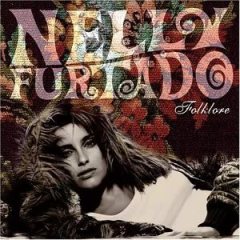Nelly Furtado – Folklore (2003)
Nelly Furtado – Folklore (2003)

1. "One-Trick Pony"
2. "Powerless (Say What You Want)"
3. "Explode"
4. "Try"
5. "Fresh off the Boat"
6. "Força"
7. "The Grass Is Green"
8. "Picture Perfect"
9. "Saturdays"
10. "Build You Up"
11. "Island of Wonder"
12. "Childhood Dreams"
Unlike some of her modern-day neo-singer/songwriter peers, Nelly Furtado never hid her ambition or her desire to be an "important" artist, which was part of the charm of her debut, Whoa, Nelly! Despite (or perhaps because of) her youth, she was willing to try anything, blending a number of sounds and styles, all of which were tied together by her sincerity and audacious desire to say something grand, or at least say everything grandly. Her musical restlessness was underpinned by a sensibility that was fundamentally serious but leavened by sly humor, all of which made Whoa, Nelly! a bracing listen. Her second album, Folklore, is a bit of a different situation. Released three years after her debut, it picks up where the first record leaves off, but it's a much more serious affair, a situation telegraphed by the album covers. Whoa, Nelly! and Folklore mirror each other -- both bear the same Nelly Furtado logo and both feature a reclining Furtado, but where the debut was bright, girlish, and rather innocent, finding her lying to the right in a field, she's now bathed in warm, dark colors, looking rather sultry as she lies to the left among a bunch of leaves. The artwork implies she's more mature, and it's a sentiment that's mirrored in the album titles, since the plainspoken Folklore lacks the humor of Whoa, Nelly! and suggests she'd rather play it straight than play around. And that's the problem with Folklore: though it surely has impressive moments, the album is a self-conscious, somber affair that takes itself far too seriously. At this point, Furtado's Achilles' heel is that she doesn't see a world outside herself. While there's a certain truth to the old axiom "write what you know," she, like many of her peers, takes this credo to extremes, believing that every emotional fluctuation she had in the aftermath of her mild stardom can make for a captivating album. While some have made great art from a similar viewpoint, the key is depersonalizing the situation and turning it toward the universal; for instance, on Nirvana's In Utero, Kurt Cobain turned his agony into poetry by alluding to it, not chronicling it, thereby making it resonate to anyone who felt disillusioned and despairing.
In contrast, Furtado's songs play like entries in a diary, so consumed with the particulars of her world that they can be suffocating in their solipsism. To a certain extent, this was true on Whoa, Nelly!, but since she had yet to reach stardom, she was writing about more universal subjects. Plus, her thrill in making her first album was palpable, giving the album a naïve, exciting charm. While there are some interesting musical moments on Folklore -- enough to make it worth a listen -- the dogged seriousness and didactic worldview become a bit overbearing not long before the album is a quarter of the way finished, particularly since the fusion of worldbeat and adult alternative pop often seems heavy-handed. Furtado does have skills and ambition, which makes her music interesting, but that's not the same thing as compelling or memorable. Much of Folklore resides in the "interesting" category, never reaching the effortlessly catchy heights of "I'm Like a Bird" or "Turn Out the Lights," and given the po-faced soberness of the record, that lack of catchiness can't help but be seen as her bid to be taken as a serious, important artist. And Furtado could very well be the serious, important artist she desires to be, but she'll need to regain some of the guileless, loose spirit of Whoa, Nelly! and temper the quirks that make Folklore an awkward transitional album. ---Stephen Thomas Erlewine, AllMusic Review
download (mp3 @320 kbs):
yandex 4shared mega mediafire uloz.to cloudmailru
Last Updated (Thursday, 11 May 2017 13:32)








